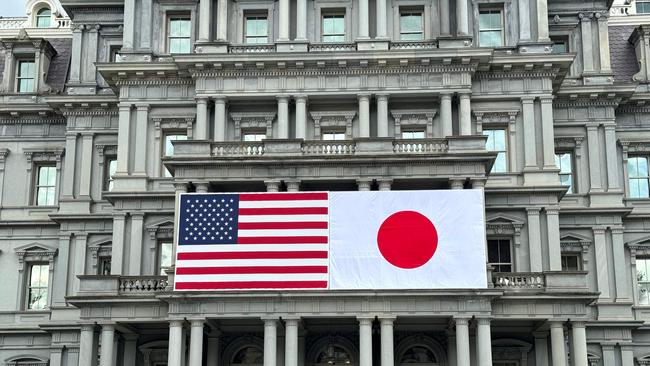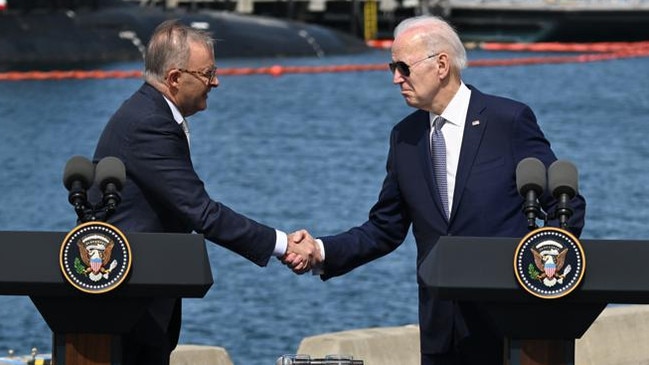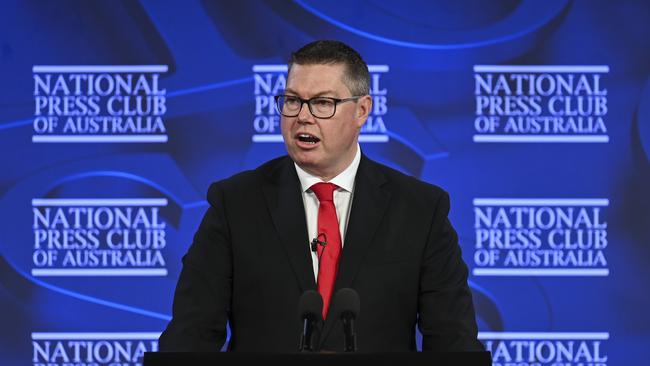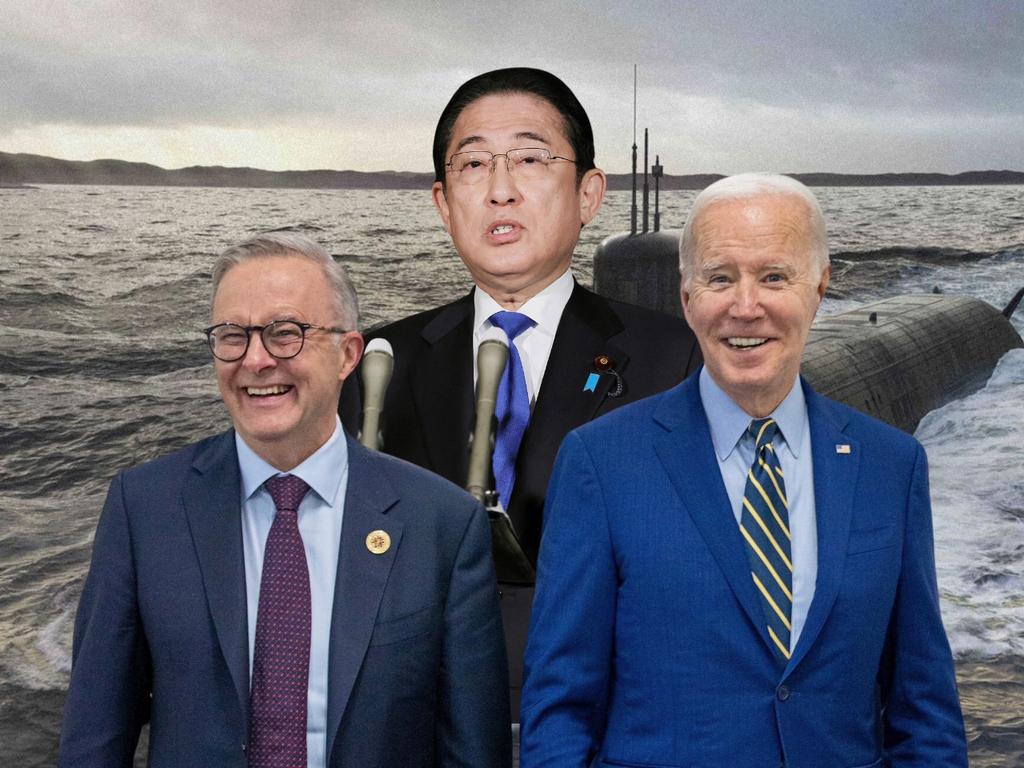AUKUS partners announce willingness to work with Japan in bid to contain China
The defence ministers of the US, UK and Australia have confirmed they are seeking to include Japan and potentially other nations as Canada expresses interest in joining.

The three AUKUS partners Australia, the UK and US have confirmed speculation the military pact will consider Japan and potentially other nations as partners in joint efforts to develop advanced weapons, in a move likely to antagonise China.
In a joint statement on Monday (Tuesday AEDT), the defence ministers of the three nations lauded progress in facilitating Australia’s acquisition of nuclear powered submarines, the central plank of the 2021 agreement, in the 2030s and signalled their willingness to “identify collaboration opportunities”, singling out Japan.
“Recognising Japan’s strengths and its close bilateral defence partnerships with all three countries, we are considering co-operation with Japan on Aukus Pillar II advanced capability projects,” the ministers said.
“AUKUS partners have developed principles and models for additional partner engagement in individual Pillar II projects and will undertake consultations in 2024 with prospective partners regarding areas where they can contribute to, and benefit from, this historic work”.

Unlike Pillar 1, which relates to the provision of nuclear powered submarines to Australia, Pillar II relates to collaborative efforts to manufacture and develop advanced weapons and military technology, including hypersonic missiles, quantum computing, artificial intelligence, undersea drones and electronic warfare.
“We are confident that engaging like-minded partners in the work of Pillar II will only strengthen this pursuit,” the statement from Australian Defence Minister Richard Marles, UK Secretary of State for Defence Grant Shapps, and US Secretary of Defence Lloyd Austin said.
“In identifying collaboration opportunities, we will take into account factors such as technological innovation, financing, industrial strengths, ability to adequately protect sensitive data and information, and impact on promoting peace and stability in the Indo-Pacific region”.
Further details will likely emerge on Wednesday (Thursday AEST) when president Joe Biden is set to host Japanese Prime Minister Fumio Kishida at the White House, where the two are expected to cement the biggest upgrade to the US-Japan security alliance since the 1960s.
China said it was concerned at the expansion, with Chinese Foreign Ministry spokesperson Mao Ning telling reporters: “We oppose relevant countries cobbling together exclusive groupings and stoking bloc confrontation.”
Japan needed to “earnestly draw lessons from history and stay prudent on military and security issues,” the Global Times reports.
Separately, Canada’s prime minister said his government was exploring the possibility of joining AUKUS in a press conference in Ottawa on Monday (Tuesday AEST).
Asked if Canada would following the footsteps of Japan, which appears set to join the Pillar II component of the military pact, he said “yes”.
“We are already observers and in working groups on pillar 2 for AUKUS and we have had excellent conversations with the US, UK and Australia on how we can work even more closely together,” he said.
Mr Trudeau said it was “good news” New Zealand and Japan had expressed interest in the three-way security pact.
“I think it’s really important that allies, particularly across the Indo-Pacific, work together in a stronger and tighter ways,” Trudeau said.
It came as Defence Industry Minister Pat Conroy arrived in Washington DC on Monday for a few days of talks on the AUKUS submarine program with US defence officials, amid growing concern the US industrial base wouldn’t be able to produce enough submarines to keep pace with US navy demands and promises to Australia.

The announcement to expand AUKUS, reported initially by Britain’s Financial Times, came despite concerns among AUKUS members that Tokyo did not yet have sufficient security arrangements in place to prevent the theft of sensitive technology.
Deputy secretary of state Kurt Campbell, speaking last week at a Centre for New American Security event, said the US had long encouraged “Japan to take on increasingly more strenuous activities that protect their intellectual property, that hold government officials accountable for the secrets they’re trusted with”.
“I think it’s fair to say that Japan has taken some of those steps, but not all of them,” he added.
A Chinese foreign minister spokesman on social media said on Monday Beijing was “gravely concerned about the US, the UK and Australia sending signals of AUKUS expansion”.
China is gravely concerned about the US, the UK and Australia sending signals of AUKUS expansion. We oppose exclusive groupings and bloc confrontation. pic.twitter.com/e8it5QY2zs
— Spokespersonå‘言人办公室 (@MFA_China) April 8, 2024
“We oppose exclusive groupings and bloc confrontation,” she added, reiterating complaints China has made repeatedly about the military pact – that it will inflame regional tensions – since it was first announced in September 2021.
Japan’s former ambassador to Australia, Yamagame Shingo, said he would “never call” the emerging, enhanced pact ‘JAUKUS’, as some commentators have.
“Why? First, credit for AUKUS should go to Australia, including its previous government. Second, No. 1 priority ought to be nuclear subs for Australia,” he posted on social media in the wake of the three-way statement.
The three-way statement made no mention of Canada or New Zealand.
Speaking separately at a Centre for Strategic and International Studies event on Monday, Japan’s US ambassador Yamada Shigeo said Japan had “clearly demonstrated strong commitment to dramatically enhance defence capabilities.”
US ambassador to Tokyo Rahm Emanuel said last week Japan, which in December announced massive increase in defence spending, was “about to become the first additional Pillar II partner”.





To join the conversation, please log in. Don't have an account? Register
Join the conversation, you are commenting as Logout